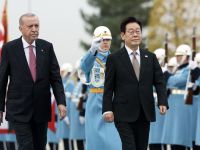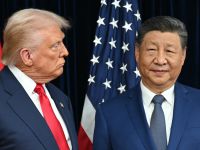By Khaled Abul Khair
Albawaba.com – Amman
In an interview with Albawaba.com Wednesday, the Afghan envoy to Cairo, Sayyed Fadlallah Fadel, said that the “army of the Islamic State of Afghanistan” would soon liberate the rest of the country from the Taliban militia, denying reports of atrocities committed by Northern Alliance forces.
The Taliban militia has ruled the country since 1996 after overthrowing the Kabul government.
The opposition Northern Alliance has sliced Afghanistan in two, leaving only pockets of Taliban resistance in the northern part of the country while tightening its grip on the capital Kabul on Tuesday.
Reports said that tribesmen took hold of Jalalabad on Wednesday, with the Taliban still in control of Kandahar and parts of the southern provinces.
Fadel, who spoke to Albawaba.com over phone, denied reports of wide-scale executions and atrocities committed by the northern forces after entering Kabul and other towns like Mazar-e-Sharif, accusing Pakistan of spreading rumors to tarnish the image of the US-backed North Alliance.
“Pakistan has realized that it has lost the game… and has started to spread rumors against the forces of the Islamic State of Afghanistan to mar its victories…all of the media have reported that the forces have been received in the liberated towns with celebrations and flowers on the part of the locals, who are happy they have gotten rid of the oppressive Taliban rule,” he said.
The diplomat stressed that the security situation the areas under the North Alliance rule was “perfect,” and that “last night was the most wonderful in years.”
Ambassador Fadel said that negotiations were underway to form a new government in Kabul, offering assurances that the Pashtun ethnic group would have its fair share of any coalition government.
Fadel said that the fate of Taliban leader Mullah Mohammad Omar and Osama bin Laden would be decide by the top authorities in Kabul, declining to say if they would be handed over to the US.
The Northern Alliance’s foreign minister, Abdullah Abdullah, told reporters on Tuesday that the two men would be tried “for their crimes.”
But Fadel said that the whereabouts of Omar and bin Laden were not yet known.
Abdullah said his forces had no choice but to enter the capital despite opposition from other countries, including the United States, said CNN.
When the Taliban suddenly pulled out of the city Tuesday morning, disturbances by "irresponsible people" with weapons forced the alliance to march in and secure the city, the news network cited Abdullah as saying.
The alliance fighters entered Kabul unopposed to scenes of "chaos and jubilation" on Monday night after a series of sweeping advances in the north, said the BBC Online, which added that the rebels had now occupied government buildings and set up checkpoints in the city.
The alliance has also taken control of the key western city of Herat, said the news service, and is pursuing retreating Taliban forces in the northeastern Kunduz province.
The rout of the ruling regime's forces came on day 38 of the US bombing campaign in response to the Sept. 11 attacks on New York and Washington, which Bush has blamed on Taliban "guest" Osama bin Laden, said Reuters.
Despite the opposition gains - and a $5 million price on his head - there is still no sign of bin Laden, added the agency.
Opposition leaders told Reuters that the Taliban stronghold of Kandahar could fall within 24 hours as moderate Taliban forces abandoned their hardline compatriots.
The stage was set at dawn when veteran mujahedeen commander Ismail Khan, accompanied by 4,000 fighters, entered his former powerbase, the city of Herat, a spokesman told the agency.
With Herat taken, the way is open for an advance on Kandahar, but BBC correspondents say the war in southern Afghanistan could be very different, as the Northern Alliance itself may be unwilling to press on into largely Pashtun territory.
The rebel force is a patchwork of different minority ethnic groups, including Uzbeks and Tajiks, and analysts fear there are already signs that their division of Kabul into different enclaves signals a turn back toward the internecine wars of the early 1990s.
However, the envoy told Albawaba.com that “there are no ethnic differences among the people of Afghanistan, but countries like Pakistan highlight the ethnic issue to justify its interference in the country.” - Albawaba.com
© 2001 Al Bawaba (www.albawaba.com)







